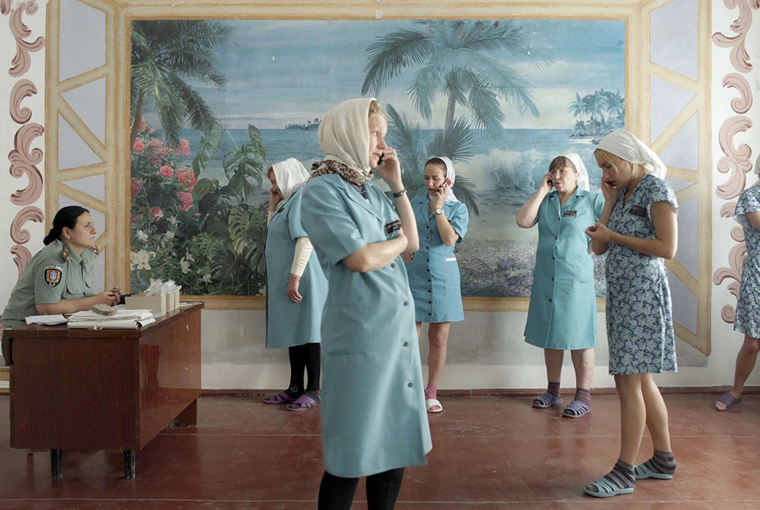
Péter Kerekes’ 107 Mothers follows the fate of 107 mothers in a prison in Odessa, where they are allowed to serve their sentences with their children until the children grow three years old. Some of the inmates sit out major charges, e.g. for killing their husbands, while some were simply caught stealing things or selling drugs. All of the women are not only prisoners of a physical space, but also caught in a space of unfreedom with a routine of daily household duties delegated to them. It seems that the prison is meant to deprive the inmates even of the restricted freedom they could potentially still enjoy within the limits of their sentence, were it not for the permanent supervision and control at the hands of the penitentiary’s administration.
The film opens with screams, tears, and pain reminiscent of Bergman’s Brink of Life (1958). The depiction of the painful details of childbirth plunges the viewer into an atmosphere of awkwardness and discomfort shared by the heroines of this film. Resorting to an aesthetic that is both polished and akin to documentary filmmaking, Péter Kerekes’ 107 Mothers focuses specifically on the stories of domestic crimes committed by Ukrainian women as it tries to get to the bottom of what caused them in the first place. In the film, the warden conducts in-depth interviews with convicted women, and as viewers, we become witness to the way the warden constructs psychological portraits of each of them. We learn that some have taken on someone else’s crime, becoming a victim of love relationships, while others are unable to overcome their own evil embodied in the plan to kill their relatives. Ultimately, all one-hundred-plus women have passed through the usual canvas of crime and now bear the punishment.
The plot zooms in on the story of convict Lesya (Maryna Klimova), who is serving a sentence for a crime of passion against her husband. At first, Lesya is in a state of recalling past events, not fully aware of or accepting the place where she has found herself in. Her ability to understand her life in prison and accept the new rules comes up against the realization that a similar fate awaits the child she was pregnant with at the time of her imprisonment. After the three years the child is allowed to stay with its mother in captivity, its destination will surely either be an orphanage and passing through a web of social workers and psychologists, or being adopted by close relatives of the convicted. Only in the rarest of cases will this fate be prevented by convicted parents being granted parole. In the film, some inmates are indeed presented with a remote review of their criminal case. Listening attentively to the judge’s decision, delivered via video link on an iPad, they hope for early release. By picturing the judge’s deliberation as taking place at a remove, the director dehumanizes the judicial process. In most cases, the verdict is negative as the mother and child look ahead to further time spent in prison.
“Cenzorka”, in Kerekes’ native Slovak, means a female censor who corrects and amends texts. The head of the penitentiary Irina (Iryna Kiryazeva) who fulfills this censoring function on an everyday basis, turns out to be another central character of the film. Irina is eternally rebuked by her mother for her lack of personal family planning and her unconventional female professional status. She tries to change the vector of her own life by attending countryside discos, but her long-lasting professional routine, which is marred by skepticism and strictness, makes it hard to find fulfillment on a personal level. She has trouble falling in love, as her mind is preoccupied with wholly different maters. The practice of general supervision, which consists of editing letters sent to prisoners, listening in on their phone conversations with relatives, and holding “heart-to-heart talks” with female prisoners, transforms her little by little by cultivating constant awareness and suspicion in relation to other people. Having subjugated the women inmates to her control, she deals in an unemotional manner with editing the personal feelings of the inmates and their relatives on the outside who are awaiting their release.
Despite this meek outlook, unlike in Eisenstein’s famous image of the baby carriage plunging from the Odessa steps, the hopeless outlook of the toddlers in 107 Mothers is ultimately transcended by a belief in the humanism and empathy of fellow human beings. Metaphorically speaking, the children born in captivity do not end up being wheeled down a flight of stairs, but are given a second chance by sorrowful Irina, who wishes to provide an ordinary life to the nestlings born in her cage. The film thus voices the belief that there is still hope for one’s future, and for human empathy, both within prison and upon release.




Leave a Comment